Grey Mullet: Difference between revisions
Klapaucius (talk | contribs) m (Text replace - "</div> {{Template:WhatLinksHere}} |}" to "{{Template:WhatLinksHere}}") |
No edit summary |
||
| Line 1: | Line 1: | ||
< | <!-- seo --> | ||
{{#seo: | |||
|title=Grey Mullet: Cooking Wiki | |||
|titlemode=replace | |||
|keywords=#greymullet #fishandseafood #seafood #baked #salted #fish #roe #dried #smoked | |||
|hashtagrev=12032020 | |||
|description=The grey mullet or flathead mullet is an important food fish for many around the world, and can be both fished and farmed | |||
}} | |||
<!-- /seo --> | |||
[[Image:Grey Mullet.jpg|300px|thumb|right|Grey Mullet & Camellia]] | [[Image:Grey Mullet.jpg|300px|thumb|right|Grey Mullet & Camellia]] | ||
The '''grey mullet''' or '''flathead mullet''' is an important food [[fish]] for many around the world, and can be both fished and farmed. The [[roe]] of this mullet is [[salted]], [[dried]] and compressed to make a speciality food with different names across the world, such as Korean ''myeongran jeot'', Japanese ''karasumi'', and Italian ''botargo''. | The '''grey mullet''' or '''flathead mullet''' is an important food [[fish]] for many around the world, and can be both fished and farmed. The [[roe]] of this mullet is [[salted]], [[dried]] and compressed to make a speciality food with different names across the world, such as Korean ''myeongran jeot'', Japanese ''karasumi'', and Italian ''botargo''. | ||
| Line 7: | Line 17: | ||
Mullet does not keep well after it is caught. If kept on ice it may remain edible for approximately 72 hours, after which it becomes nearly inedible. The sooner it can be eaten after being caught, the better. | Mullet does not keep well after it is caught. If kept on ice it may remain edible for approximately 72 hours, after which it becomes nearly inedible. The sooner it can be eaten after being caught, the better. | ||
{{SeasonalInfoIs}} | |||
August, September & October. | |||
{{CategoryLineIngredients}} | |||
[[Category:Ingredients]] | [[Category:Ingredients]] | ||
[[Category:Fish and seafood]] | [[Category:Fish and seafood]] | ||
<!-- footer hashtags --><code 'hashtagrev:12032020'>#greymullet #fishandseafood #seafood #baked #salted #fish #roe #dried #smoked </code><!-- /footer_hashtags --> | |||
Latest revision as of 08:55, 1 April 2014

The grey mullet or flathead mullet is an important food fish for many around the world, and can be both fished and farmed. The roe of this mullet is salted, dried and compressed to make a speciality food with different names across the world, such as Korean myeongran jeot, Japanese karasumi, and Italian botargo.
On the coast of northwest Florida and Alabama, this mullet, called the Striped or Black Mullet, is often a speciality of seafood restaurants. Fried mullet is most popular, but smoked, baked, and canned mullet are also eaten. Local fishermen usually catch mullet in a castnet, though some use a hook. Mullet is a delicacy in this area and is most often consumed in the home. Mullet are usually filleted (with the remaining parts used for fish stock) and then used in chowders and stews.
Mullet does not keep well after it is caught. If kept on ice it may remain edible for approximately 72 hours, after which it becomes nearly inedible. The sooner it can be eaten after being caught, the better.
Seasonal Information: Grey Mullet
This information is specifically for countries in the northern temperate zone of the Northern Hemisphere; particularly the United Kingdom, however it should be applicable for northern USA, northern Europe, Canada, Russia, etc.
Grey Mullet is at its best and in season during the following months: August, September & October.
Find recipes that contain 'Grey Mullet'
#greymullet #fishandseafood #seafood #baked #salted #fish #roe #dried #smoked